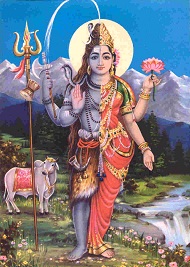MAHA SIVARATRI ;
Maha Shivaratri or ‘The Night of Shiva’ is celebrated all over India on the 14th moonless night in Phalgun. It is very auspicious festival on which people keep fast and chant ‘Om Namah Shivaya’ all night. Sweets like saboodana kheer, cashewnut barfi, shivratri raita, aloo khichdi, potato pumpkin pancakes and tikki along with Thadai (Bhaang) is distributed.
Origin of Shivratri:
"Om Namah Shivaya!":
The Festivity:
People observe a strict fast on this day. Some devotees do not even take a drop of water and they keep vigil all night. The Shiva Lingam is worshipped throughout the night by washing it every three hours with milk, curd, honey, rose water, etc., whilst the chanting of the Mantra "Om Namah Shivaya" continues. Offerings of Bael leaves are made to the Lingam as Bael leaves are considered very sacred and it is said that Goddess Lakshmi resides in them.Hymns in praise of Lord Shiva, such as the "Shiva Mahimna Stotra" of Pushpadanta or Ravana's "Shiva Tandava Stotra" are sung with great fervour and devotion. People repeat the 'Panchakshara' Mantra, "Om Namah Shivaya". He, who utters the names of Shiva during Shivratri, with perfect devotion and concentration, is freed from all sins. He reaches the abode of Shiva and lives there happily. He is liberated from the wheel of births and deaths. Many pilgrims dock to the places where there are Shiva temples.
Importance In Hinduism:
According to the Hindu mythology, Lord Shiva declared that the rituals
performed by his devotees on the 14th day of the dark fortnight in the
month of Phalgun please him the most. Therefore, year by year, the day
is observed as Mahashivratri, wherein devotees observe fast, sing songs
and bhajans and offer prayers to the Almighty to seek his blessings.
Pujas conducted in Lord Shiva temples during the day have significance
too. This is because the rituals are conducted strictly in accordance
with the method that is prescribed in Shiva Purana, a Hindu epic.
According to the Purana, poojas are conducted once in every three hours,
on Maha Shivaratri.
Importance In Human Lives:
It is believed that the devotion of Lord Shiva on Mahashivaratri would freed the devotee from the past sins. Moreover, the devotee would reach the adobe of Lord Shiva and live there happily, because he/she is liberated from the cycle of birth and death, once he/she attains moksha or salvation. Therefore, all the devotees of Lord Shiva would flock the temples to offer their prayers. To serve the purpose, jujube fruits, stalks of Bilwa leaves, flowers and garlands are offered to the Shiva Linga by the devotees. If the devotee celebrates the festival at home, he/she would perform the Mahashivratri Puja by taking a holy bath (in warm water) early in the morning, wearing new clothes and then smearing bhasm (holy ash) on their forehead.
A Festival Significant for Women :


